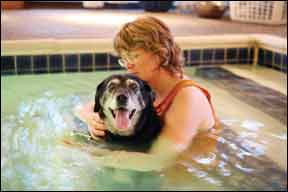You’re out for a walk in the park with Sasha, your 6-month-old German Shepherd, who is a little nervous around small children. Suddenly out of nowhere, a five-year-old girl runs up from behind squealing, “Can I pet your dog?” while grabbing for Sasha’s head. A freaked out Sasha reacts by biting the girl’s arm, and it’s more than just a nip. A frantic scene ensues complete with screeching from both the girl and her parents. You are subsequently sued for significant damages, medical expenses, and pain and suffering. You need a dog lawyer!

288
A “dog lawyer,” or more accurately, an animal lawyer or animal law attorney, is an attorney who specializes in matters of animal law. Circumstances in which you may need sound legal advice and representation from someone with extensive experience with dog-related cases are not limited to dog bite incidents. Veterinary malpractice cases, custody issues in divorces, and landlord-tenant disputes are just a few examples of when an animal law attorney can help with legal issues pertaining to your dog.
What is Animal Law?
A relatively new and diverse legal specialty, animal law is an umbrella term encompassing all types of non-human animals. Animal law includes animals used in research, sports or entertainment, livestock, animals in the wild and wild animals in captivity, as well as companion animals. Issues in animal law range from contracts to property rights, government regulation, torts, and criminal matters.
In 2000, nine law schools in the U.S. offered courses in animal law. According to the Animal Legal Defense Fund (ALDF), the number offering animal law courses has now increased to 100 of the 200 law schools approved by the American Bar Association. A decade ago, an attorney specializing in animal law might have raised eyebrows. But high profile legal cases in recent years involving dog fighting rings, tainted pet foods, and pet trusts amounting to millions of dollars, in addition to a greater presence of the animal welfare and animal rights movements in the legal arena, have added credibility and legitimacy to this fast emerging area of law.
Part of the reason for the rapid increase in the number of animal lawyers is due to the rise in status of our companion animals and their importance in our lives. Today’s owners often spend thousands of dollars to provide their dogs or cats with the best health care, training, day care, and grooming. For those owners, attorney’s fees are viewed as just another necessary expense in caring for and protecting their pets.
Can’t Any Lawyer Handle This?
Anyone licensed to practice law in your state is theoretically qualified to take on almost any legal matter. However, most attorneys develop expertise in one or two areas of law. The law regarding animals is complex and continually changing, with new legislation enacted, new rules and regulations applied, and new interpretations impacting existing statutes. An experienced animal law attorney is more qualified to represent your interests than a general practitioner or an attorney who specializes in other areas.
Many legal matters that may involve your dog don’t have to end up in court. Settling issues to the satisfaction of all parties involved without a court case is always preferable. Using a mediator to facilitate a mutually acceptable resolution may be an option. When resolving issues on your own is unlikely or impossible, the following are services that an animal law attorney can provide:
Veterinary malpractice. Like medical malpractice, veterinary malpractice involves issues of a professional’s competence and judgment. As with medical care for people, sometimes things go terribly wrong. Veterinary malpractice is professional negligence, an error that should not be made based on a level of competence expected of a veterinarian as a result of specialized training and experience, which results in injury or death to your dog.
If you feel an error was made by your veterinarian in treating your pet, an animal law attorney can help you determine if the case is actionable (malpractice) or a case of simple negligence (carelessness) that does not constitute malpractice. Examples of malpractice include misdiagnosis, prescribing inappropriate medication, following the wrong course of treatment, or abandoning treatment.
The lack of significant monetary damages to the owner usually makes veterinary malpractice lawsuits impractical to pursue. If your dog is injured, you can recover only the amount paid for vet services. If your dog dies, most states consider only “market value” of your dog, and you can recover only the amount needed to replace your dog. Even if you win your court case, the cost of pursuing a veterinary malpractice lawsuit will likely exceed the amount you will recover. There have been awards for non-economic damages from negligent veterinarians for emotional distress or loss of companionship, but proposed reforms in state legislatures allowing recovery for these damages are not yet widely accepted. Some states have laws recognizing sentimental value, and some allow owners to sue for mental anguish, but laws are still developing in these areas and are not well defined.
If possible, it is most prudent to settle your matter outside the courtroom. A mediator can help defuse emotions of both parties and assist in working out issues between you and your veterinarian. If your vet carries malpractice insurance, it is possible to reach a settlement with the insurance company without going to court.
Veterinarians are licensed by the state in which they practice, so you can also lodge a complaint with your state licensing agency. After an investigation, the agency may pursue disciplinary action, if appropriate. This may include fines, additional training, suspension, and/or revocation of the veterinarian’s right to practice. Some state veterinary associations have a dispute resolution service, a quicker and less expensive alternative than a court case.
Injury or death. The law also provides for the recovery of damages if your dog is injured or dies because of a deliberate or careless act of someone other than your veterinarian. Dogs have suffered or died due to product defects, tainted food, attacks by another dog, and mistreatment and mishandling by groomers, trainers, dog walkers, kennels, dog sitters, and transport services.
Keep in mind that, as with a veterinary malpractice lawsuit, the monetary damages you may receive in a court case may not even cover the costs of going to court. Working out a settlement is quicker and less expensive. Pet care professionals as well as transport services, including airlines, often have liability insurance. You may be able to reach a settlement directly with the insurance company. Again, a mediator may be helpful in working out issues.
If you do have to go to court, small claims court is probably the best choice. Depending on your state, lawsuits in small claims court are limited to between $3,000 and $10,000. Small claims court offers you the opportunity to resolve your dispute with less complication and at low cost by representing yourself. Most states allow you to be represented by a lawyer if you choose, but hiring a lawyer is not cost efficient in most cases. According to Nolo Press (nolo.com), several studies show that people who represent themselves in small claims cases do as well as those who are represented by a lawyer.
Tenant/landlord disputes. Policies regarding pets are often unclear in leases or homeowners association agreements. Even when polices are clearly spelled out, they may not be uniformly applied or enforced. For example, you may move into an apartment or buy a home where dogs are welcome and later be told that they are not allowed. If you don’t know your legal rights your options are limited to moving out or getting rid of your dog. Try to find a workable solution with your landlord or homeowners association. If not, an animal law attorney will be familiar with any local laws and ordinances regarding pets in rental properties, homeowners association agreements, and state housing and disability laws for people with service dogs.
Contractual disputes and consumer claims. Contractual disputes and consumer claims involve the purchase of animals or products and services related to their care. Fewer than 20 states currently have “Lemon Laws” for dogs, allowing buyers to return an unhealthy dog to the seller (breeder, broker, or pet store) for another dog or a refund. Several of these states require the seller to provide the consumer with written notice of their rights under the law.
Other examples of consumer fraud and contractual disputes involve misrepresentation (your puppy is not purebred as claimed), defective products, or services contracted for but not provided as specified (pet cremation or burial). An animal law attorney can represent your interests if you are a victim of fraud or are treated unfairly in the marketplace.
Custody and ownership disputes. Pet custody disputes have become increasingly common in divorce cases. The bonds that people form with their dogs can make an already emotionally charged situation even more volatile. When you and your spouse decide to split up, you may not love each other anymore but your dog loves both of you. If you are unable to reach an agreement as to who will get custody of your dog, the courts will have to decide for you. Sole custody, joint custody, sole custody with visitation, no ongoing relationship, and splitting up pets between partners are all up for consideration in custody disputes.
Current laws provide for companion animals to be treated as personal property, and the home determined based on property laws as part of the marital estate. While current societal attitude is moving away from this treatment, and some judges make exceptions to the property model, the laws do not yet reflect this trend.
There is no standard in law for what is in the best interest of the dog. The best case scenario with a divorce is when you and your spouse put aside emotion and resentment and focus on what is truly best for your dog. If you can come to a decision on your own, the most the courts will have to do is review the settlement agreement that you have reached. If you are unable to do this, an animal law attorney who understands the bonds that people establish with animals, and what caring for them entails, can be your advocate.
Custody and ownership disputes are not limited to divorces. Legal representation may also be of benefit in cases of breakups of live-in relationships, a bailment (when a dog is left in the temporary care of another), a dog’s pregnancy, or a breech of a sales agreement.
Dog bites. Millions of people are bitten by dogs every year. We know that any dog can and will bite given the right (or wrong) set of circumstances. What is your liability as an owner if your dog bites someone? Dog bite laws vary greatly from state to state. There are three basic types of dog laws that may make you liable for damages or injuries caused by your dog. Strict liability laws hold the dog’s owner liable for just about any injury your dog causes. The only possible exceptions to strict liability laws are bites to a veterinarian, a trespasser, or someone who provokes the dog.
“One bite” laws basically allow your dog one “free” bite but hold the owner liable for a second bite. An exception is if you knew, or should have known, that your dog could hurt someone.
Negligence laws are common in most states; if the owner is unreasonably careless in controlling their dog, and this negligence results in injury, the owner is liable. In addition to addressing dog bites, there are state statutes that cover other types of injuries or property damage caused by dogs where the owner may be held liable.
If your dog bites someone and you are sued, how will you pay the victim’s damages? If the victim wins in court you may be paying not only for medical costs, but also for lost wages and pain and suffering. Homeowner’s or renter’s insurance is your best protection. Make sure your policy covers dog bites, and be certain your dog’s breed is covered as well. If you are sued for damages, you will need a lawyer. An animal law attorney familiar with your state’s bite laws and experienced in dog bite cases will be your best choice.
Estate planning. Many dog owners want to provide for the care of their animals after they die. Because by law animals are property, they cannot be beneficiaries of a standard will. Simply put, dogs cannot own property.
While you can’t leave your estate directly to your dog, there are things you can do to better ensure that your final wishes for your dog’s care and maintenance will be honored. Most states now allow trusts for animals. By establishing a legally enforceable pet trust you can leave property for the benefit of your dog, with a trustee in charge of managing it. You may also name a new owner for your dog in your will or in a revocable living trust. If you don’t name a new owner, your dog will likely go to your next of kin in most states. And when you name a person as the new owner of your dog in your will, you can also leave money to that person for the costs of caring for your dog.
Note: An entire article devoted to estate planning for your pets will appear in an upcoming issue of WDJ.
How do I Find an Animal Law Attorney?
There are few attorneys who practice animal law exclusively. In general, it’s not a specialty that is financially viable practiced on its own. Lawyers and law firms who offer animal law as one of their specialties will provide the expertise and experience to assist you in pursuing your legal matter that others who only dabble in animal law may not.
We asked four animal law specialists for their suggestions regarding engaging the services of a “dog lawyer” and their answers appear on the facing page. The following are further suggestions for finding an animal law attorney:
–Your local shelter may know someone who handles animal law cases.
–Call your local bar association. Many offer referral services (for a fee) to find an attorney with experience to match your needs.
–The website for the American Bar Association (findlegalhelp.org) has state-by-state listings of lawyers and can be searched by legal specialty.
–Legal publisher Martindale-Hubbell’s website (lawyers.com) lists animal law attorneys by state and city.
Once you have found a qualified attorney, ask some pointed questions: “How many years have you practiced animal law? What portion of your practice does it constitute? Have you handled cases like mine before? What were the outcomes? How much will this cost?”
Don’t overlook the lawyer-client relationship; you may end up spending a significant amount of time with this person, and you should feel comfortable discussing details of your case with him or her, even when emotionally difficult. Chemistry is important. Ask the attorney questions; if you can’t understand her answers, or you are uncomfortable with her style of communicating, she may not be the right person for the job.
If you are unable to find an animal law attorney in your area, ask your lawyer to find one to consult with on your particular legal matter.
Self-Representation?
If you decide to do your own legal research there is a vast body of information available on the Internet, including websites that list animal-related laws state-by-state. You can also contact your local courthouse or law school to find the nearest public law library.
The old legal maxim is “he who represents himself in court has a fool for a client.” If an issue involving your dog is serious enough to end up in court, no matter how solid you believe your case is, consider retaining competent legal representation. It can mean the difference between keeping your dog or losing custody, receiving compensation for an injury to your dog or paying thousands in medical bills, or even whether your dog lives or dies. Don’t be that foolish client. When it involves the dog you love, and the stakes are high, hiring a “dog lawyer” is money well spent.
Susan Sarubin, CPDT-KA, PMCT, is owner of Pawsitive Fit, LLC, Puppy and Dog Training in Easton, Maryland. She’s also Maryland State Coordinator for Rhodesian Ridgeback Rescue, Inc. See page 24 for contact information.
















